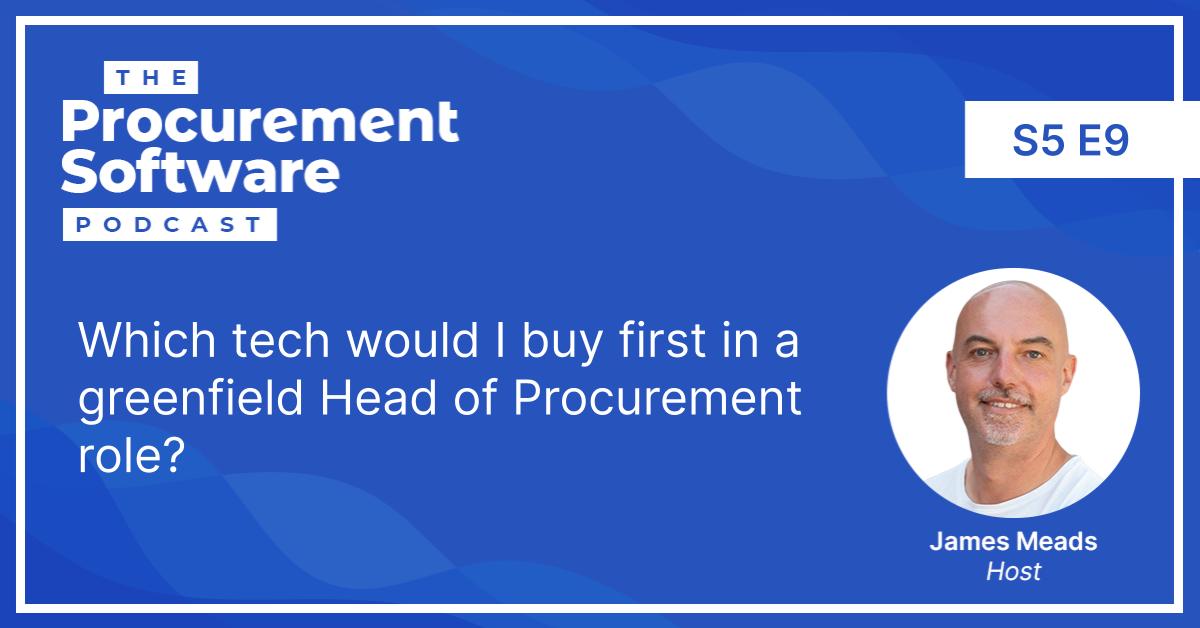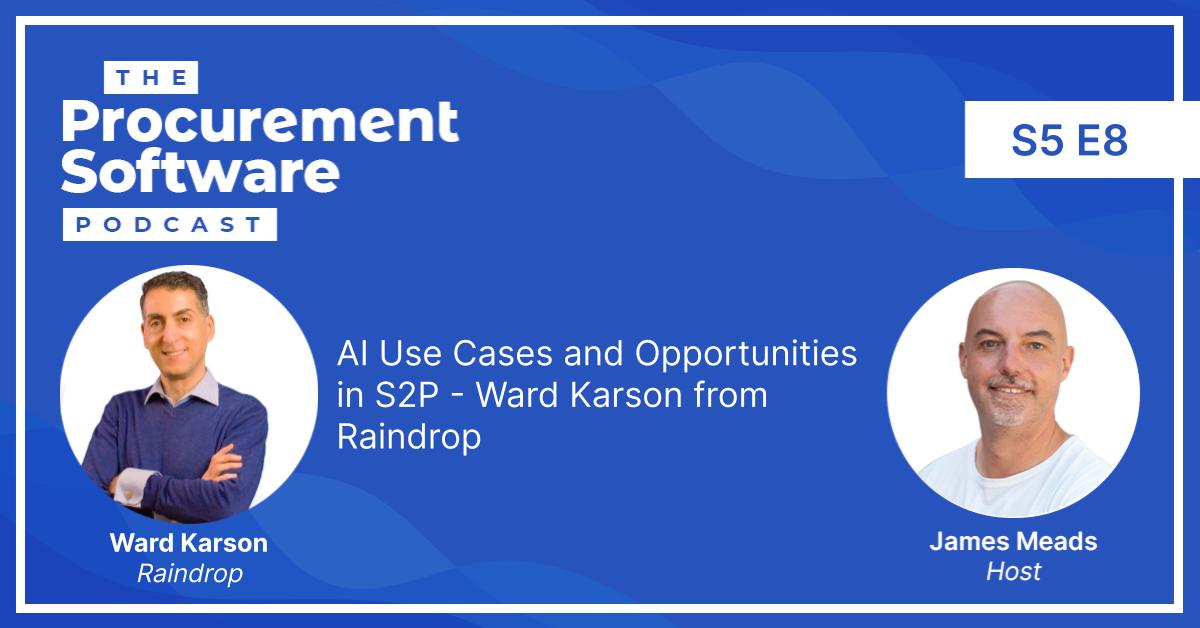Welcome back to the Procuretech podcast!
We’re continuing our third series of interviews with industry experts and thought leaders.
Today we’re talking to someone with a unique niche perspective, to hear their thoughts on all things digital procurement.
Why Data is the Bedrock of Digital – Susan Walsh is The Classification Guru
My guest needs absolutely no introduction to most of you: Susan Walls, the classification, Guru herself.
Susan was one of our first guests in series one, all the way back in April 2020. A lot has changed in the world since then, but before we dive into that, let’s get a quick reminder of Susan’s background.
Susan Walsh – A brief background on the Classification Guru
Susan has been running The Classification Guru for just over five years now. She started working for a spend analytics company, before deciding to go it alone.
Susan thought there must be companies out there who just want their data classified and normalised, without the analytics part. And she was right.
Spend analytics is being increasingly brought in-house – most departments have some kind of analyst now. But people still struggle with classification.
That’s where Susan comes in, bringing a human touch and years of experience to classification.
The Classification Guru can help with things like supplier cleansing for PT implementations and CRM systems. Susan is also currently working on an exciting project outside of the procurement space for retail category management.
Basically, if you’ve got a data problem, Susan can help with it.
Because Susan’s service isn’t a tech solution, it’s not the sort of thing we’d usually cover here on procurementsoftware.site. But Susan’s niche is a really interesting perspective from which to view procurement.
So how has her business been impacted by the rise of procurement technology over the last few years?
The impact of procurement and technology
Susan thinks that the expansion of procurement tech has helped her business.
There are so many solutions saying “buy our software, it’ll fix your data”. But the reality is, you have to clean that data before a tool can do anything with it.
People are realising the importance of data, but at the same time they don’t have the know how to manage it. They don’t fully understand the tools they’re using. There’s an assumption that this process will be 100% automated, but that’s often not the case.
It’s so important to get it right, and clean the data before you automate it.
There are hybrid solutions out there. These either offer consultancy alongside automation, but are usually more focused on enterprise level complex material master data more than vendor master data.
There are also solutions that use AI to scrape, clean and sort the data – Tealbook and Scoutbee for example. But they’re not classifying data, they’re essentially just supplier discovery platforms that can help to categorise data as part of that offering.
But where’s that data coming from? How do you know it’s valid? Is there a human behind it?
You should always have someone who knows the industry double check data. Verify whatever you’re buying in with what you know, just to make sure it’s right.
Automation can be successful and accurate when you focus on a specific area. But if you’re buying a tool that tries to cover every single industry in the world, it’s not going to hit the mark as well, because it’s trying to be everything to everyone.
Bigger data, bigger problem
Generally, the bigger the organisation, the bigger the dirty data problem.
Because they’ve grown through acquisition, big companies often have multiple ERP systems. That can very easily lead to a real tangle of complicated data.
But mid market businesses also have an issue here. Their data is not going to be as dirty as an enterprise company that’s grown through acquisition over the years, but a smaller company might not have the in-house expertise to clean it’s data effectively.
Data can be real trouble, and not everyone knows where to start. When Susan hears that a company is going to try and do it in house, it gives her shivers because she knows The Categorisation Guru could do it quicker, more efficiently and accurately.
In-house, it could take something like 6-12 months. The Categorisation Guru could get it done in two or three.
What area of procurement has the biggest impact, from a data perspective?
Susan sees so much going on in this space right now that it’s hard to call out one specific thing.
But she’s interested in the advancements in P2P and fraud prevention tech: The kind which scans invoices to minimise things like fraud, or paying the same invoice twice because it’s named slightly differently.
The biggest data problems start with people. So if you can remove the points where there are most likely to be errors caused by people, then that’s great.
For smaller businesses that haven’t even started with any sort of digital transformation yet, having something like a process automation bot in AP can be really valuable.
Just getting a company to build a bot for you to automate or simplify some of the most repetitive tasks can be a game changer: It’s efficiencies, its accuracy, it’s helping to minimise fraud.
Especially if you’re a small business, the impact of fraud or paying an invoice twice is so much more devastating than in a larger organisation where this can be absorbed.
But again, you always just need someone who is knowledgeable in the area, overseeing everything and checking that it’s still working.
Using digital technology to liberate your talent
Digital technology is a means to enable procurement professionals to do what they should be doing.
It’s a topic we keep coming back to – the real value in this tech is that it frees up expensive, valuable knowledge workers to be able to do something more relevant to their profession and skillset.
Often, Procurement don’t do a very good job of promoting themselves and the value that they bring.
If you free up their valuable time, they can then focus on the more strategic effort. Whether that’s cost efficiencies, rational, rationalising suppliers, negotiating better deals with existing suppliers, finding new ones…
Automation allows procurement to focus more on these things, which in turn will benefit the business.
There’s still a lot of manual intervention going on in the whole procurement process from contracting to managing suppliers to spend analytics. Which means that it’s prone to errors, mistakes, fraud, etc.
If you can automate as much of that as possible, you’re minimising all those things, and hopefully increasing profits for the company.
Future Proofing
As a small business owner, one of the things that you have to be very mindful of is future proofing. One of Susan’s key USPS is doing a lot of manual work to maintain data accuracy.
But with tech getting smarter, at some point there will be a spend analytics platform that can get 95% of the job done using AI and machine learning.
Without giving away too many trade secrets, what is Susan doing to future proof her business?
Susan thinks that, even if such a solution comes out in the near future, it’s not going to be affordable to anyone but very large organisations. So the need for human input isn’t going away any time soon.
But she’s not sitting on her laurels. Susan also wrote a book last year, where she shares a lot of her knowledge on classifying and fixing dirty data.
She’s also working on online courses through which to share her unique perspective and experience.
Some will be generic data cleaning courses, and others will be procurement specific.
Her next plan is to build an actual product. A SaaS tool that she thinks is going to blow up massively, and that could create jobs as well.
But she’s not going to give away any more clues on that one, for now…
Wrapping Up
If you want to get in touch with Susan Marsh, The Classification Guru, you can find her on LinkedIn, YouTube, or her website.
You’ll find links to these, and to Susan’s exciting new book, below.
Stay in touch
- Buy Susan’s book, Between The Spreadsheets
- Visit The Classification Guru website
- Follow The Classification Guru on LinkedIn
- Check out Susan’s YouTube channel
- Sign up for the Procurement Software Newsletter
- Book an Intro Call and let’s talk all things Digital Procurement!
- Connect with James on LinkedIn
- Follow Procurement Software’s LinkedIn Page


